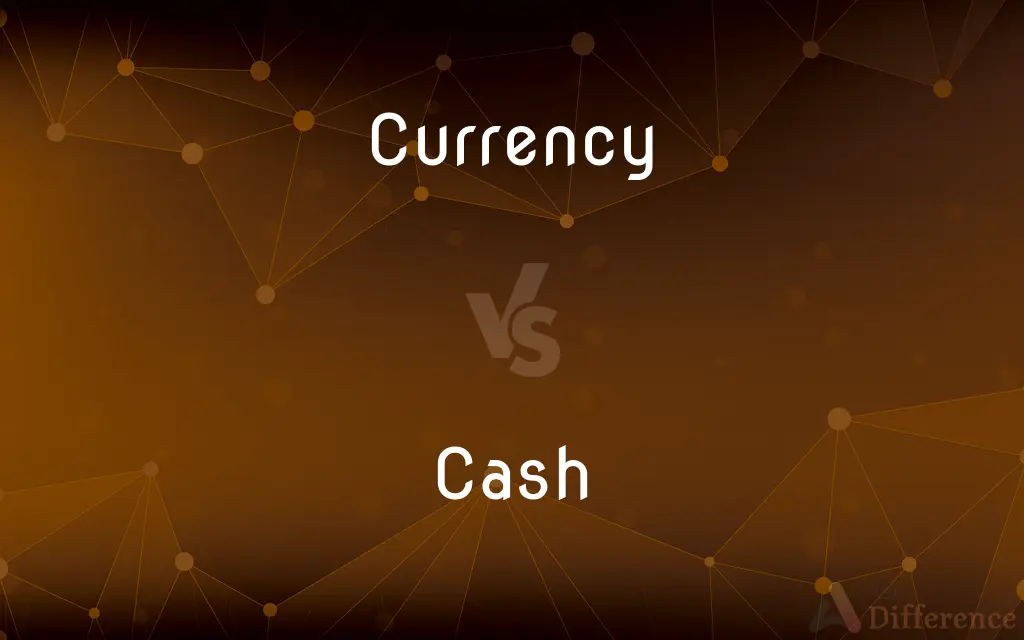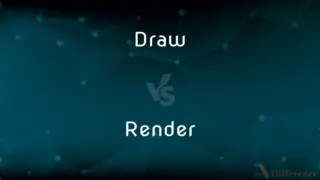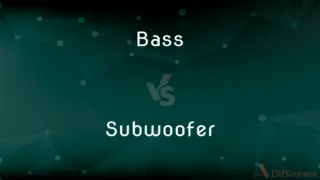Currency vs. Cash — What's the Difference?
By Tayyaba Rehman — Updated on November 4, 2023
Currency is the system of money in general use in a particular country, while Cash refers specifically to physical money, such as coins and banknotes.

Difference Between Currency and Cash
Table of Contents
ADVERTISEMENT
Key Differences
Currency encompasses all forms of money used as a medium of exchange, including banknotes and coins (cash), as well as digital or electronic forms. Cash, however, strictly means the physical form of currency that can be held and exchanged by hand. In discussing Currency and Cash, it’s important to understand that all cash is currency, but not all currency is cash. Currency is a broader term that includes various forms of money, whether it be cash, credit, or digital funds, that are used to facilitate trade and economic transactions. Cash is the tangible form of currency that is used in everyday transactions.
Currency represents the idea of economic value that can be traded for goods and services, while Cash is the actual physical manifestation of this concept. Currency can take many forms, including digital currency, which can be used for transactions online or through electronic systems. Cash, in contrast, is limited to physical transactions where banknotes and coins are exchanged. Currency's role in the economy is vast and complex, as it includes all forms of money that make up the financial system. Cash, however, plays a more focused role, often associated with immediate, face-to-face transactions.
Currency, as a term, also implies a certain legitimacy and backing by a governing body, typically a country’s central bank. This means that currency includes not only cash but also the electronic deposits held at banks that can be converted into cash or used for digital payments. Cash is the portion of currency that can be immediately used without the need for any electronic systems or intermediaries. Currency’s value is not just physical; it's also symbolic, representing trust in the economic system. Cash's value, on the other hand, is as much physical as it is symbolic, being the actual bearer instrument that can be exchanged without question.
The difference between Currency and Cash can be seen in the way they are stored and handled. Currency in digital form is stored in accounts and transacted through electronic transfers, while Cash is stored physically in wallets, cash registers, or safes and handled manually during transactions. Currency, being a broader concept, facilitates not only current transactions but also future contracts and investments. Cash is more immediate and is required for those who prefer or need to transact without digital means or as a universally accepted form of payment for debts.
Comparison Chart
Form
Includes digital and physical money
Only physical banknotes and coins
ADVERTISEMENT
Use
General term for all transaction mediums
Used for immediate physical transactions
Representation
Symbolic and physical value
Primarily physical value
Storage
Can be digital or physical
Must be stored physically
Accessibility
May require electronic access
Always available for direct use
Compare with Definitions
Currency
A system of money in general use in a country.
The Euro is the official currency of 19 of the 27 European Union countries.
Cash
Liquid assets including money on hand or an asset that can be quickly converted to cash.
He invested most of his cash in stocks.
Currency
The fact or quality of being generally accepted or in use.
The idea quickly gained currency among the students.
Cash
Money in coins or notes, as distinct from checks, money orders, or credit.
I had to pay in cash since the store didn't accept credit cards.
Currency
The period during which something is in use or operation.
The currency of this older operating system is nearly at its end.
Cash
In economics, cash ( (listen) kash, or kaysh in AuE) is money in the physical form of currency, such as banknotes and coins. In bookkeeping and financial accounting, cash is current assets comprising currency or currency equivalents that can be accessed immediately or near-immediately (as in the case of money market accounts).
Currency
The actual use or circulation of money in economic trading.
They were concerned about the lack of currency in rural areas.
Cash
Money in the form of bills or coins; currency.
Currency
A reference to the digital forms of money transactions.
Cryptocurrency is a type of digital currency that is gaining popularity.
Cash
Liquid assets including bank deposits and marketable securities.
Currency
A currency in the most specific sense is money in any form when in use or circulation as a medium of exchange, especially circulating banknotes and coins. A more general definition is that a currency is a system of money (monetary units) in common use, especially for people in a nation.
Cash
Money paid in currency or by check
Paid in cash.
Currency
A system of money in general use in a particular country
Travellers cheques in foreign currency
The dollar was a strong currency
Cash
Any of various Asian coins of small denomination, especially a copper and lead coin with a square hole in its center.
Currency
The fact or quality of being generally accepted or in use
The term gained wider currency after the turn of the century
Cash
To exchange for or convert into ready money
Cash a check.
Cash in one's gambling chips.
Currency
Money in any form when in actual use as a medium of exchange, especially circulating paper money.
Cash
(uncountable) Money in the form of notes/bills and coins, as opposed to cheques/checks or electronic transactions.
After you bounced those checks last time, they want to be paid in cash.
Currency
Transmission from person to person as a medium of exchange; circulation
Coins now in currency.
Cash
Liquid assets, money that can be traded quickly, as distinct from assets that are invested and cannot be easily exchanged.
Currency
General acceptance or use; prevalence
The currency of a slang term.
Cash
Money.
Currency
The state of being current; up-to-dateness
Can you check the currency of this address?.
Cash
Cash register, or the counter in a business where the cash register is located.
Let me just bring these to the cash for you.
Currency
Money or other items used to facilitate transactions.
Wampum was used as a currency by Amerindians.
Cash
An instance of winning a cash prize.
Currency
Paper money.
Cash
A place where money is kept, or where it is deposited and paid out; a money box.
Currency
The state of being current; general acceptance or recognition.
The jargon’s currency.
Cash
Any of several low-denomination coins of India, China, or Vietnam, especially the Chinese copper coin.
Currency
(obsolete) Current value; general estimation; the rate at which anything is generally valued.
Cash
(transitive) To exchange (a check/cheque) for money in the form of notes/bills.
Currency
(obsolete) fluency; readiness of utterance
Cash
(poker slang) To obtain a payout from a tournament.
Currency
A continued or uninterrupted course or flow like that of a stream; as, the currency of time.
Cash
To disband. To do away with, kill
Currency
The state or quality of being current; general acceptance or reception; a passing from person to person, or from hand to hand; circulation; as, a report has had a long or general currency; the currency of bank notes.
Cash
(slang) Great; excellent; cool.
Currency
That which is in circulation, or is given and taken as having or representing value; as, the currency of a country; a specie currency; esp., government or bank notes circulating as a substitute for metallic money.
Cash
A place where money is kept, or where it is deposited and paid out; a money box.
This bank is properly a general cash, where every man lodges his money.
£20,000 are known to be in her cash.
Currency
Fluency; readiness of utterance.
Cash
Ready money; especially, coin or specie; but also applied to bank notes, drafts, bonds, or any paper easily convertible into money
Currency
Current value; general estimation; the rate at which anything is generally valued.
He . . . takes greatness of kingdoms according to their bulk and currency, and not after intrinsic value.
The bare name of Englishman . . . too often gave a transient currency to the worthless and ungrateful.
Cash
To pay, or to receive, cash for; to exchange for money; as, cash a note or an order.
Currency
The metal or paper medium of exchange that is presently used
Cash
To disband.
Currency
General acceptance or use;
The currency of ideas
Cash
A Chinese coin.
Currency
A current state of general acceptance and use
Cash
Money in the form of bills or coins
Currency
The property of belonging to the present time;
The currency of a slang term
Cash
Prompt payment for goods or services in currency or by check
Cash
Exchange for cash;
I cashed the check as soon as it arrived in the mail
Cash
To give or obtain notes and coins in exchange for a check or bill.
She cashed her paycheck at the bank.
Cash
The immediate payment of money for goods or services.
The festival vendors demanded cash on delivery.
Cash
Refers to money counted by the number of bills and coins rather than its value.
We split the cash evenly among the siblings.
Common Curiosities
Does 'currency' only refer to modern forms of money?
No, currency includes any historical forms of money that were used as a medium of exchange.
What does it mean to say a currency is 'strong'?
A strong currency means it has high value compared to others in the foreign exchange market.
Is cash still important in today's digital world?
Yes, cash remains important for many transactions, particularly those that are small or immediate.
Can the term 'currency' refer to something non-monetary?
Yes, 'currency' can also refer to the general acceptance or use of an idea or practice.
Is cash a less secure form of currency?
It can be, as it is susceptible to theft and loss in physical form.
Why do some businesses operate on a cash-only basis?
Some businesses prefer cash to avoid transaction fees or for simplicity in accounting.
Is digital money considered currency?
Yes, digital money is considered a form of currency.
Can 'cash' be used as a verb?
Yes, 'cash' can mean to convert a check or other form of currency into physical money.
What is currency?
Currency is the system of money in general use in a particular country or socio-economic context.
What is cash?
Cash specifically refers to physical forms of currency, such as coins and banknotes.
What happens when a currency is no longer accepted as cash?
It may become a collectible or historical item if it's no longer legal tender.
Does 'cash' include coins?
Yes, cash includes both coins and paper money.
Is it possible for currency to have no cash form?
Yes, some modern forms of currency exist only in digital form, like certain cryptocurrencies.
Are there limits on how much cash one can carry?
While there are no limits on carrying cash domestically, there are reporting requirements for international travel.
Can I exchange one currency for another in cash?
Yes, this is commonly done at currency exchange services or banks.
Share Your Discovery

Previous Comparison
Draw vs. Render
Next Comparison
Bass vs. SubwooferAuthor Spotlight
Written by
Tayyaba RehmanTayyaba Rehman is a distinguished writer, currently serving as a primary contributor to askdifference.com. As a researcher in semantics and etymology, Tayyaba's passion for the complexity of languages and their distinctions has found a perfect home on the platform. Tayyaba delves into the intricacies of language, distinguishing between commonly confused words and phrases, thereby providing clarity for readers worldwide.














































